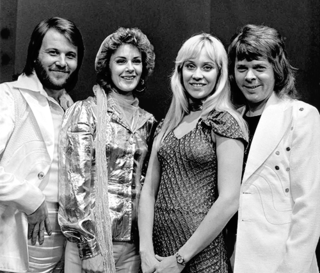
ABBA were a Swedish pop group formed in Stockholm in 1972 by Agnetha Fältskog, Björn Ulvaeus, Benny Andersson, and Anni-Frid Lyngstad. They are one of the most popular and successful musical groups of all time, and are one of the best-selling music acts in the history of popular music.
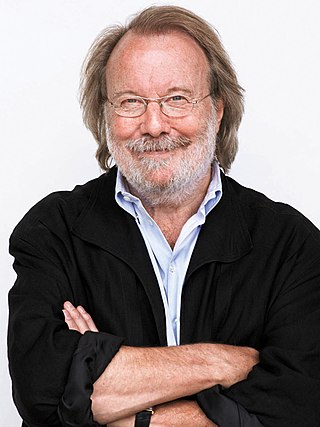
Göran BrorBennyAndersson is a Swedish musician, composer and producer best known as a member of the pop group ABBA and co-composer of the musicals Chess, Kristina från Duvemåla, and Mamma Mia! For the 2008 film version of Mamma Mia! and its 2018 sequel, Mamma Mia! Here We Go Again, he worked also as an executive producer. Since 2001, he has been active with his own band Benny Anderssons orkester.
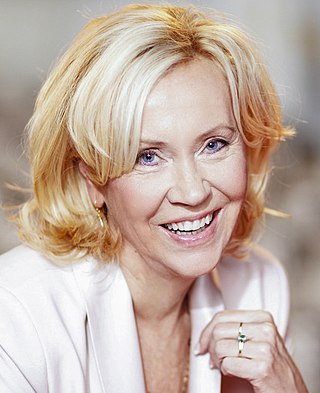
Agneta Åse Fältskog, known as Agnetha Fältskog and AnnaFältskog, is a Swedish singer, songwriter and a member of the pop group ABBA. She first achieved success in Sweden with the release of her 1968 self-titled debut album. She rose to international stardom in the 1970s as a member of ABBA, which is one of the best-selling music acts in history. She is the youngest member of ABBA, and the only one born in the 1950s.

The Hep Stars are a Swedish rock band formed in Stockholm in 1963. During 1965–1966 the band was the most successful of contemporary 1960s Swedish pop groups performing in the English language. Outside the Nordic countries the band is best known as a launching point for the keyboard player, lead guitar and composer Benny Andersson, who went on to enjoy worldwide success with ABBA.

Ted Arnbjörn Gärdestad was a Swedish singer, songwriter, musician and actor known internationally as Ted. Gärdestad began his acting career in 1966 and began playing music in 1971, signing with Polar Music. Assigned with in-house producers Benny Andersson and Björn Ulvaeus, Gärdestad released his first single, "Hela världen runt," in late 1971 and worked closely with the four members of ABBA to create his debut album Undringar (1972). As Polar Music's best-selling solo artist, he continued to work with the group members throughout the 1970s, releasing three more albums Ted (1973), Upptåg (1974) and Franska Kort (1976), which were moderately successful. In 1978, Gärdestad released his first English-language album, Blue Virgin Isles, which did not have success internationally, as his predecessor albums had in his home country.

Ring Ring is the debut studio album by the Swedish group ABBA, initially credited as Björn & Benny, Agnetha & Frida. It was released in Scandinavia on 26 March 1973, and later in a limited number of other territories, including West Germany, Australia, South Africa and Mexico, through Polar Music. It was a chart-topping album in Belgium, and a big success in the Netherlands, Norway and South Africa.

Voulez-Vous is the sixth studio album by the Swedish supergroup ABBA. Released on 23 April 1979, the album yielded five hits, all of them big 1979 singles in Britain – "Chiquitita", "Does Your Mother Know", "I Have a Dream" and the double A-side "Voulez-Vous"/"Angeleyes".

Frida ensam is the second studio album by Swedish singer Anni-Frid Lyngstad. It was first released by Polar Music in 1975 while Lyngstad was a member of the pop group ABBA and produced by her then-fiancé and fellow ABBA member, Benny Andersson. The album has since been re-released several times, most significantly in remastered form in 2005 with bonus tracks. The lead song was the original version of "Fernando" sung in Swedish by Lyngstad, later popularised in its English version by ABBA. The album was a huge success in Sweden and was certified platinum.

"One of Us" is a song by Swedish pop group ABBA. It was released in December 1981 by Polar Music as the lead single from the band's eighth studio album, The Visitors (1981). Written by Benny Andersson and Björn Ulvaeus, who also produced it, the song has lead vocals by Agnetha Fältskog and is about a woman trying to revive a relationship she had ended. It would become ABBA's last major hit for 40 years, and the last No. 1 single of their career, topping the charts in Belgium, Denmark, West Germany, Ireland and the Netherlands. "One of Us" was also a top-10 hit in countries like Austria, Norway, South Africa, Spain, Switzerland and the UK. In the US, where it was released in 1983, it only charted on the Billboard Bubbling Under the Hot 100 chart and the Adult Contemporary chart, peaking at number 107 and 33, respectively. The music video for the song was directed by Lasse Hallström, featuring Fältskog as a woman moving into her new house. "One of Us" has since been covered by Pandora in 1995, A-Teens in 1999 and Cher in 2018.

Polar Music is a Swedish record company founded in 1963 by Stig Anderson and his friend Bengt Bernhag.
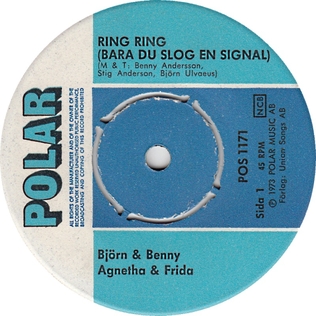
"Ring Ring ", in English: "Ring Ring ", titled simply as "Ring Ring" in the English single version, is a song by Swedish group ABBA, released as the title track of their 1973 debut album.
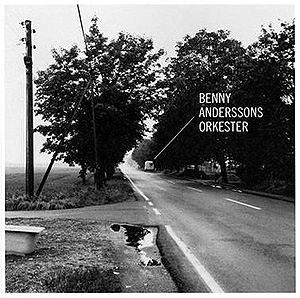
Benny Anderssons orkester is the first album by Benny Anderssons orkester, released in June 2001.

"Moviestar" is a song written and recorded by Swedish singer-songwriter Harpo. Following two hit singles on Tio i Topp, Harpo wrote the song while sitting in his window, dedicating it to a friend of his that had aspirations of becoming an actor. "Moviestar" tells the story of an individual who believes they are an A-list actor in the league of Steve McQueen and James Dean, when instead it is revealed that they have only acted in a television advertisement. It makes multiple references to popular culture, including movie producer Ingmar Bergman.

"Eagle" is a song recorded in 1977 by Swedish pop group ABBA. It was the opening track on their fifth studio album, ABBA: The Album (1978), and at 5 minutes 51 seconds, the longest they ever released. As the third and final official single from the album, it was issued in a limited number of territories. These did not include the United States, where an intended release was cancelled, or United Kingdom.

"Thank You for the Music" is a song by the Swedish pop group ABBA. It was originally featured on the group's fifth studio album, The Album (1977), and was released as a double-A sided single with "Eagle" in May 1978 in limited territories, namely Belgium, the Netherlands, Germany, France, Austria, Switzerland and Australia. In South Africa where it peaked at number 2 in August 1978 and became the eighteenth best-selling single of that year.

"Rock Me" is a song recorded in 1974 by Swedish pop group ABBA, with Björn Ulvaeus singing the lead vocals. It was first released on their third album, ABBA, and was used as the B-side to the group's 1975 single "I Do, I Do, I Do, I Do, I Do". However, after "I Do, I Do, I Do, I Do, I Do" hit number one in both Australia and New Zealand, "Rock Me" was released as an A-side in April 1976, reaching number four and number two respectively. It was also issued as an A-side in Yugoslavia and in 1979 it was included on the band's Greatest Hits Vol. 2 album.
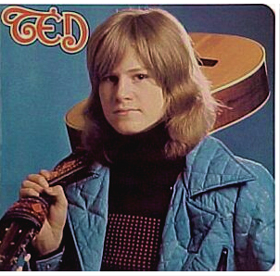
Ted is the second studio album from Swedish singer/songwriter Ted Gärdestad, released in 1973 through Polar Music. It contains the hits "Jag Ska Fånga En Ängel", "Sol, Vind Och Vatten", "Come Give Me Love" as well as his 1973 Melodifestivalen entry "Oh Vilken Härlig Da'". The album was produced by Benny Andersson, Björn Ulvaeus and Ted, engineered by Michael B. Tretow and features backing vocals by Agnetha Fältskog and Anni-Frid Lyngstad. The CD version of the album was released in 1991.

Live at Wembley Arena is an album of live recordings by Swedish pop group ABBA, released by Polar Music on 26 September 2014, on 2 CD, 3 LP and digital format.
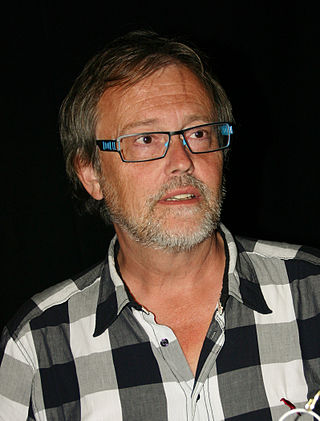
Per Erik Hallin is a Swedish keyboard player, singer and songwriter. He has worked as a musician in many different contexts and in different parts of the world. His music is heavily influenced by the African American music tradition such as soul, jazz, blues and gospel.

Voyage is the ninth and final studio album by the Swedish pop group ABBA, released on 5 November 2021. With ten songs written by Benny Andersson and Björn Ulvaeus, it is the group's first album of new material in forty years, following The Visitors (1981). The album was supported by the dual single release of "I Still Have Faith in You" and "Don't Shut Me Down", released alongside the album announcement on 2 September 2021. "Just a Notion" was issued as the third single on 22 October 2021, followed by the fourth single "Little Things" on 3 December. A digital concert residency in support of the album, ABBA Voyage, opened in London on 27 May 2022.



















